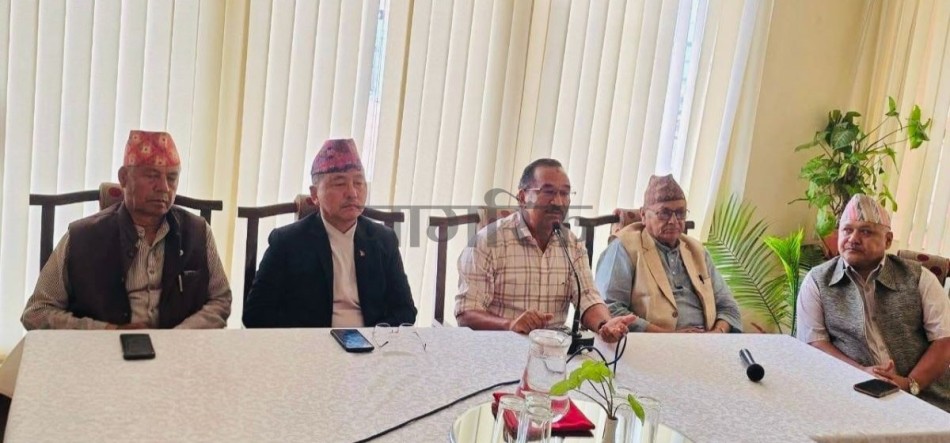Kathmandu, May 27: Leaders advocating for the restoration of monarchy and the declaration of Nepal as a Hindu state, while demanding the abolition of federalism, have announced that the “people’s movement” they plan to launch from May 29 will be a ‘peaceful satyagraha’. In a meeting with editors in the capital on Tuesday—two days ahead of the protest—they assured that their activities would not involve violence.
Rastriya Prajatantra Party (RPP) Chairman Rajendra Lingden emphasized, “The programs of the movement will be completely peaceful, non-violent, and in the spirit of satyagraha. There will be no activities from our side that incite violence.”
Other leaders spearheading the campaign—such as former National Panchayat Chairman Navaraj Subedi, Rastriya Shakti Nepal Chairman Keshar Bahadur Bista, and RPP Nepal Chairman Kamal Thapa—also clarified the rationale behind the upcoming protest. They all reiterated their commitment to peaceful protest.
Former Deputy Prime Minister Kamal Thapa stated that opposing federalism is not an anti-constitutional act. “Although I voted against the constitution during its endorsement, I later worked to defend it,” he said, adding, “We are standing in favor of monarchy and a Hindu state by exercising the very rights guaranteed by the constitution.”
Enough is Enough, Satyagraha to save lives (With Video)

He noted that their agenda—to restore monarchy and declare Nepal a Hindu state—has remained consistent, even when registering their party and contesting elections. Responding to a statement by Minister for Communication and Government Spokesperson Prithvi Subba Gurung, who suggested a possible ban on the royalist movement, Thapa remarked, “The constitution clearly states that no political party can be banned. Our movement is entirely peaceful. We will carry it forward as a civilized campaign and will not clash with police or administration anywhere.” He added, “A huge number of people will take to the streets, and through this collective force, we will compel the government to engage in dialogue.”
Rastriya Shakti Nepal Chairman Keshar Bahadur Bista said he launched the campaign out of concern that over the past 18 to 20 years, the absence of monarchy and Hinduism—alongside the continuation of federalism—has put the nation at risk. “Now that the country is in crisis, everyone—from journalists to civil servants—must join hands,” he said, explaining his decision to support the movement. Bista also mentioned that the leaders had emphasized the positive aspects of their campaign in response to Prime Minister KP Sharma Oli’s call to ruling party cadres to occupy the streets. “We invited you here to appeal for support because we sense danger looming over this civil disobedience movement,” he said.
Movement coordinator Navaraj Subedi also stressed that the protest would remain non-violent. “The government’s approach is inappropriate. Even the Prime Minister has made concerning remarks,” he said, requesting, “This is a peaceful movement. You must witness it as observers. While many journalists represent different ideologies, we believe you will stand with the truth.”
RPP Chairman Rajendra Lingden affirmed that the movement, regardless of its scale, would remain under their control. “There will be no violent actions from our side,” he reiterated. He stated that they plan to hold the protest in the Ratnapark area, although journalists noted that the government reportedly wants to restrict demonstrators outside the Ring Road. “That’s why we are counting on your support,” he added.
When asked why a movement was necessary despite the constitutional provision allowing the establishment of a monarchy and Hindu state with a two-thirds majority, Lingden responded, “Given the current electoral system, it’s nearly impossible to secure a two-thirds majority except in exceptional cases.” He argued that the political transformations of 1950, 1990, and 2006 were not achieved through ballots but through direct public engagement. “We announced this people’s movement because the time is right,” he said. “We’ve taken to the streets in a ‘satyagraha’ model because that’s what the moment calls for.”
Lingden also clarified that the movement is being carried forward both inside and outside Parliament. “Since Parliament alone isn’t sufficient, we are using the streets to strengthen our dissent,” he explained.
Lingden added that the problems facing the country stem not only from leadership but also from systemic issues. “It is corrupt leaders who are responsible,” he said. “But the agencies tasked with holding them accountable—the Commission for the Investigation of Abuse of Authority and the judiciary—are filled with individuals appointed by those very leaders.” He argued that this makes systemic reform necessary.
Regarding former King Gyanendra’s royal takeover on February 1, 2005, Lingden said, “We are not trying to bring back a king who stages coups like the one on February 1, 2005. We’ve been clear about that.” He added, “We need to correct the shortcomings from both the monarchy and republican sides to forge a new system. Now is the time for monarchists and republicans to sit together and find mutual understanding.”
Lingden acknowledged that those who lived through on February 1, 2005 may still fear it and that even in the republic, there have been abuses of power and mistakes. “We must learn lessons from these events,” he said. “If every other country can progress, there is no reason Nepal cannot. We are not advocating monarchy and Hindu statehood out of political self-interest.” He explained that beyond electoral politics, the nation needs a unifying institution, which is why they support the monarchy.
RPP Nepal Chairman Kamal Thapa said that the people’s movement is a legitimate method to seek new national consensus. “Some people believe in a republic, while others support a monarchy,” he said. “This is a competition of ideas.” He clarified that discussions are not focused on who the monarch should be but rather on the monarchy as an institution. “February 1, 2005 was an event from a particular time. We must learn from both the bitter and sweet lessons of the past and move forward,” Thapa concluded.





































